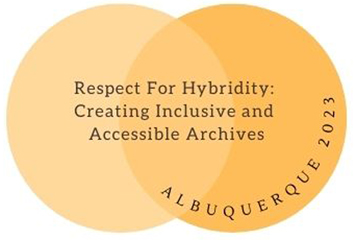Image courtesy of New Mexico TRUE
Land Acknowledgement
As stewards of New Mexico’s rich documentary heritage, the Society of Southwest Archivists (SSA) recognizes the stolen and occupied ancestral lands of the Pueblos of Haak’u [Acoma], Ko-tyīt [Cochiti], Shiewhibak [Isleta], Walatowa [Jemez], Ka’wai’ka [Laguna], Nambé Owingeh, Ohkay Owingeh, Pe’ewi [Picuris], P’o-suwae-geh Owingeh [Pojoaque], Tuf Shur Tia [Sandia], Katishtya [San Felipe], Po-Who-Geh Owingeh [San Ildefonso], Tamaya [Santa Ana], Kah’p’oo Owingeh [Santa Clara], Kewa [Santo Domingo], Taos, Tet-sugeh [Tesuque], Shiwina [Zuni], and Tsiya [Zia]; Fort Sill Apache Tribe, the Haisndayin [Jicarilla Apache Nation], the Mescalero Apache Tribe; and the Diné Nation. We further recognize all the ancestors that have walked and lived on these lands, as their contributions have molded our histories and our cultures. As responsible custodians of our history, we collectively include an honest narrative of colonization and its impact–no matter the discomfort we or others may feel. Indeed, it is this discomfort that suggests we are heading in the right direction. As a profession, we acknowledge our role as knowledge keepers and the problematic methods through which materials have been historically collected and shared. We strive to do better, for our profession, for ourselves, and for the future generations of New Mexicans to come.
As {an ally of} Indigenous archivists, we recognize that our Tribal colleagues serve their communities with additional responsibilities. They answer not only to the archival profession, but to the people in their communities. The preservation of their archival resources–whether transmitted through language, oral history/traditions, or affixed to a physical or digital medium–also involves the preservation of Indigenous knowledge systems that provide context to these resources. SSA recognizes the work our Tribal peers do to get their community’s history correct.
